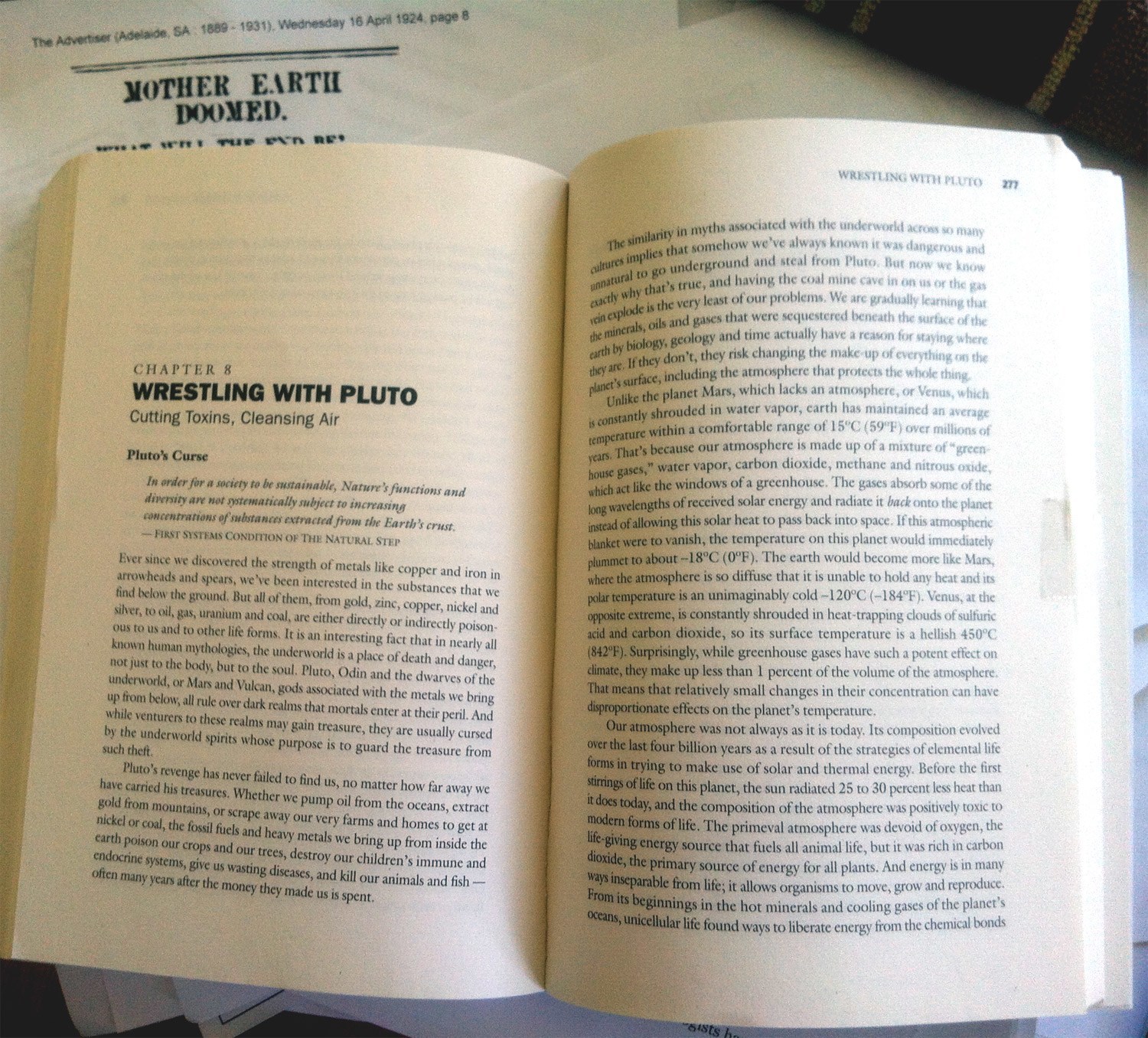According to Canada’s most prominent environmentalist, the mining of gold, silver, copper and other minerals poses an unacceptable risk to the planet’s atmosphere
Yesterday I observed that although the public is told that wind energy is clean and green, industrial wind turbines are made of steel – which depends on the mining of iron ore (see here).
I quoted Andrea Jennetta, who points out that “pretty much everything we use in modern life – including every form of renewable energy you can think of – requires the extensive mining of raw materials from the earth.”
A correspondent has since drawn my attention to a section of David Suzuki’s 2002 book, titled Good News For a Change. I own a paper copy, but it’s also available in a reasonably-priced Kindle edition and is searchable online (click the Amazon image here).
Chapter 8 is titled Wrestling With Pluto: Cutting Toxins, Cleansing Air. The first three paragraphs are astonishing. The bolding has been inserted by me:
Ever since we discovered the strength of metals like copper and iron in arrowheads and spears, we’ve been interested in the substances that we find below the ground. But all of them, from gold, zinc, copper, nickel and silver, to oil, gas, uranium and coal, are either directly or indirectly poisonous to us and to other life forms. It is an interesting fact that in nearly all known human mythologies, the underworld is a place of death and danger, not just to the body, but to the soul. Pluto, Odin and the dwarves of the underworld, or Mars and Vulcan, gods associated with the metals we bring up from below, all rule over dark realms that mortals enter at their peril. And while venturers to these realms may gain treasure, they are usually cursed by the underworld spirits whose purpose to guard the treasure from such theft.
Pluto’s revenge has never failed to find us, not matter how far away we have carried his treasures. Whether we pump oil from the oceans, extract gold from mountains, or scrape away our very farms and homes to get at nickel or coal, the fossil fuels and heavy metals we bring up from inside the earth poison our crops and our trees, destroy our children’s immune and endocrine systems, give us wasting diseases, and kill our animals and fish – often many years after the money they made us is spent.
The similarity in myths associated with the underworld across so many cultures implies that somehow we’ve always known it was dangerous and unnatural to go underground and steal from Pluto. But now we know exactly why that’s true, and having the coal mine cave in on us or the gas vein explode is the very least of our problems. We are gradually learning that the minerals, oils, and gases that were sequestered beneath the surface of the earth by biology, geology and time actually have a reason for staying where they are. If they don’t, they risk changing the make-up of everything on the planet’s surface, including the atmosphere that protects the whole thing. [photo here]
The chapter ends this way:
We have to call it quits, and leave Pluto and his hoard of underworld treasure alone.
A world without steel doesn’t only preclude wind farms, it precludes bridges – since steel girders are what make them safe. A world without metals is one in which hammers, nails, screws, drills, saws, shovels, rakes, and hoes don’t exist. Not to mention computers, phones, cameras, televisions, factories, airplanes, coins, and gold jewellery.
If using material dug from the earth is off limits, there goes bricks, cement, and shingles. We’re back to building our homes out of uncut wood, twigs, and mud.
The gospel according to Suzuki is that anything that comes out of the ground is poison. Digging up minerals is “unnatural.” Mining anything risks “changing the make-up of everything on the planet’s surface, including the atmosphere.”
Am I the only one who thinks that the people who gave this book glowing reviews didn’t actually read it?
Suzuki devotes a few pages to discussing greenhouse gases, the “burning of carbon-based fuels,” and the fact that we humans “enthusiastically made this atmosphere-destroying process the basis for modern industrial society.”
Then he bizarrely spends the rest of the chapter extolling the virtues of bicycles, public transit, and solar panels – none of which would exist without mining and minerals. ‘Incoherent’ doesn’t begin to describe his analysis.
It should, however, now be clear where all of this is headed. It’s there on the page – in stark black and white.
The David Suzukis of the world want to dismantle every oil pipeline and shutter every coal pit. Fossil fuels are, after all, the Great Satan.
But it wouldn’t stop there. Next on their agenda would be mining in general.
These people are prepared to play the “we can’t risk disrupting the environment” card again and again.
Until we’re all shivering in the dark in caves. Until even arrowheads and rudimentary spears have been banned.






